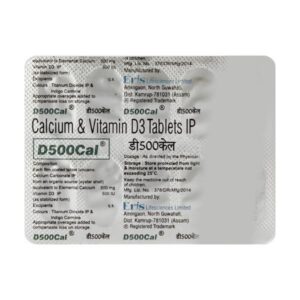VIT D3 + CALCIUM + MINERALS
Vit D3: Vitamin D3 (also known as cholecalciferol) is a fat-soluble vitamin that is essential for maintaining healthy bones and teeth. It is produced in the skin when exposed to sunlight, and it can also be obtained through dietary sources such as fatty fish, egg yolks, and fortified dairy products. However, Vitamin D deficiency is common, especially in areas with limited sunlight exposure, so supplementation may be necessary.
The primary use of Vitamin D3 is to prevent and treat Vitamin D deficiency. It helps the body absorb calcium and phosphate from the diet, which are crucial for maintaining strong bones and teeth. It also plays a role in immune function, cell growth, and hormone regulation.
Vitamin D3 works by binding to specific receptors in target tissues, such as the intestines, bones, and kidneys. This activates the receptors and promotes the absorption of calcium and phosphate, which are necessary for bone mineralization and remodeling.
The recommended daily dose of Vitamin D3 varies depending on age, sex, and specific medical conditions. Generally, the adequate intake level for adults is around 600 to 800 international units (IU) per day. However, a higher dose may be needed to correct a deficiency, and this should be determined by a healthcare professional. Vitamin D3 supplements are available in various strengths, ranging from 400 IU to 5000 IU, and should be taken orally.
Vitamin D3 is generally safe when taken as recommended. However, excessive doses can lead to vitamin D toxicity, which can cause symptoms like nausea, vomiting, loss of appetite, constipation, and weakness. Prolonged high levels of Vitamin D can also lead to hypercalcemia (elevated levels of calcium in the blood), which can result in kidney stones, heart rhythm abnormalities, and organ damage.
It is important to note that individual vitamin D requirements can vary. Therefore, it is advisable to consult with a healthcare professional to determine the appropriate dose for your specific needs and to monitor for any potential side effects or interactions with other medications.
Calcium: Drug Name: Calcium
Description: Calcium is a mineral that is essential for various physiological processes in the body. It plays a crucial role in maintaining strong bones and teeth, proper muscle function, nerve transmission, and blood clotting.
Use: Calcium supplementation is commonly used to treat or prevent low blood levels of calcium (hypocalcemia), as well as to support healthy bone density and prevent osteoporosis. It is also used as an adjunct therapy for conditions such as osteomalacia, rickets, and hypoparathyroidism.
Mechanism of Action: Calcium works by acting as a co-factor for numerous enzymatic reactions in the body. It binds to receptor sites on the plasma membrane, triggering the release of neurotransmitters and regulating muscle contraction. In bones, calcium plays a vital role in mineralization and maintaining bone density.
Dose: The recommended dosage of calcium depends on the individual’s needs and the specific condition being treated. In general, the daily recommended intake (DRI) for adults is around 1000-1200 mg per day. This can vary depending on age, gender, and certain medical conditions. It is important to consult with a healthcare professional to determine the appropriate dosage.
Side Effects: When taken as directed, calcium supplements are generally safe for most individuals. However, some potential side effects may include constipation, bloating, gas, and an upset stomach. In rare cases, excessive intake of calcium supplements may lead to hypercalcemia (high levels of calcium in the blood) which can cause symptoms such as excessive thirst, nausea, vomiting, confusion, and kidney problems. Individuals with certain conditions, such as kidney stones or heart problems, may need to exercise caution when taking calcium supplements. It is advisable to speak with a doctor or pharmacist about potential interactions or contraindications before initiating calcium supplementation.
Minerals: I’m sorry, but “Minerals” is not the name of a specific drug. Minerals are naturally occurring substances found in food and are essential for the proper functioning of the human body. There is no single drug called “Minerals.” However, there are various mineral supplements available in the form of tablets or capsules that contain specific minerals like calcium, magnesium, iron, zinc, etc.
Mineral supplements are commonly used in cases where there is a deficiency or insufficiency of a particular mineral in the body. They may also be used in certain medical conditions where increased levels of specific minerals are required. It is essential to consult with a healthcare professional or a registered dietitian before starting any mineral supplement.
The mechanism of action of mineral supplements depends on the specific mineral being consumed. Each mineral has its own function in the body. For example, calcium is necessary for strong bones and teeth, while iron is essential for the formation of red blood cells. The dose and frequency of taking mineral supplements depend on the individual’s age, sex, and specific mineral needs. It is crucial to follow the guidance and dosage recommendations provided by a healthcare professional or as mentioned on the product label.
While mineral supplements are generally considered safe when taken as directed, there can be side effects associated with their use. Side effects may vary depending on the specific mineral and dosage. Some common side effects may include constipation, diarrhea, upset stomach, nausea, or allergic reactions. It is advisable to discontinue use and seek medical attention if any severe side effects occur.
It is important to note that mineral supplements should not be used as a substitute for a balanced diet. It is usually best to obtain minerals from a varied diet that includes fruits, vegetables, whole grains, and lean proteins, rather than relying solely on supplements.


